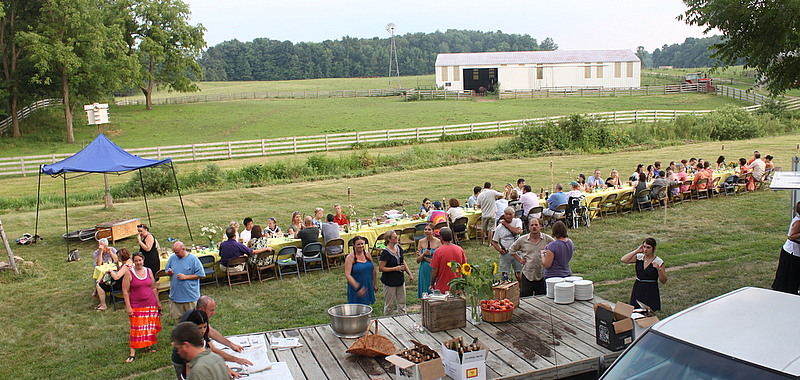Revised Common Lectionary Reflection, Eleventh Sunday after Pentecost, Year A, Proper 15

August 16, 2020
Lessons: Isaiah 56:1, 6-8; Psalm 67; Romans 11:1-2a, 29-32; Matthew 15 (10-20), 21-28
Theme: God’s faithful and generous people know that God’s ideas about inclusion, about who is and who is not welcome at the table, are often far different from those of humankind.
Key Scripture: Thus says the LORD: Maintain justice, and do what is right, for soon my salvation will come, and my deliverance be revealed. – Isaiah 56:1
When you have more than you need build a longer table not a higher fence. (Author unknown)
We humans seem to be much better at building fences than at crafting communal tables. It’s not a new problem. Our scripture lessons this week from Isaiah, Romans, and Matthew address the idea of reframing our human notions of inclusion to see the issue from a divine perspective. Needless to say, God’s idea of inclusion is much broader than many of our own.
The Old Testament lesson from Isaiah 56 is one of a series of hope-filled messages addressed to a beleaguered people torn from their land. “Guard my common good: Do what’s right and do it in the right way, for salvation is just around the corner, my setting things right is about to go into action” (Isaiah 56:1, The Message). Sounds really wonderful, right? Just behave and everything will work out fine. In the macro view this all sounds doable, but then we get the micro view (and do be sure to read verses 2-5 for fuller context) that includes all the foreigners, outcasts, and “damaged goods” of society. In fact, the lesson ends with the prophet proclaiming these words of God: “…for my house shall be called a house of prayer for all peoples. Thus says the Lord GOD, who gathers the outcasts of Israel, I will gather others to them besides those already gathered” (Isaiah 56:7b-8).

Even our psalm this week, Psalm 67, has a communal focus that includes all nations of the earth. Paul, in Romans, is working out and explaining how his people, the Jews, will be saved. Paul gets God’s big message of inclusion, although even this apostle has his own blind spots. But Jesus? Could Jesus really have a big old blind spot, some outsider biases going on in this lesson? This week Jesus heads out to the district of Tyre and Sidon, prosperous Roman port cities located in what is now Lebanon. It is here that Jesus encounters the Syrophoenician woman, who comes after him shouting, “Have mercy on me, Lord, Son of David, my daughter is tormented by a demon” (Matthew 15:22). Typical for a Jewish male of the time, he ignores her. The disciples find her behavior embarrassing, or maybe Jesus’ lack of response was making them uncomfortable, and they urge him to send her away. Instead, God incarnate tells her, “I was sent only to the lost sheep of the house of Israel” (Matthew 15:24). Really, Jesus?
And yet the Syrophoenician woman persists, humbling herself at his feet, pleading for his help. She knows what Jesus is capable of when it comes to healing. Jesus, in turn, doubles down referring to her and her people as dogs. The Rev. Dr. Wil Gafney, in her excellent reflection on the lesson, says
In a gospel that does not sound like good news to me, Jesus said to a woman kneeling at his feet begging for help for her child, “Let the children be filled first, for it is not good to take the children’s food and throw it to the dogs.” Did Jesus just call that woman a b—-? I know this is Jesus and we’ve been trained to read him and hear him religiously, more than religiously, divinely, incarnationally. But where I come from you cannot call a child a dog without calling her mama a dog and you cannot call a woman a dog without calling her a b—-.
You can read the rest of her essay here. It may challenge some folk’s ideas of inclusion, but remember that even Jesus gets his ideas of inclusion adjusted, and we can find other places in scripture where God changes the divine mind—but always with the result that a longer table is built. God is not in the business of building higher walls that separate and divide. God wants to gather us in, give room for everybody, a place at life’s table and a chance to live in God’s abundance forever.

One might think we’d learn. Jesus did. Maybe we’re just a little slower on the uptake. More likely we just need a discipleship refresher course to remember why we are called to be “little Christs” in this world. As Jesus did in his encounter with the Syrophoenician woman, we can reframe our ideas and grow into the fullness of discipleship and life in Christ. We can become more generous table builders so that there is no need for higher walls; in fact, let’s just go ahead an break down walls and barriers whenever we can and use the raw materials to build a better table, a more just world, and a community of faith where all are welcome. Amen.
In Worship
Perhaps you’ve heard the term “farm to table” signifying that a restaurant cooks with local, fresh foods. Maybe our churches could take a clue from this locavore dining movement and be more like “God to table.” What would it look like to build a longer table in your community? What walls need to come down for this to happen? What attitudes, customs, and practices need reframing so that the table can be longer?
If you are still worshiping digitally or in small groups or outdoors, consider a dinner church service. In this time of pandemic, you might need to have small groups form several tables that can be properly socially distanced and have each table be responsible for bringing its own food and table settings, but wouldn’t it be wonderful to have a worship service with more tables and table fellowship? How might you be creative and invite your neighbors to participate?
Looking for a new hymn for worship? Consider “Build a longer table, not a higher wall” by David Bjorlin. Click here for details about free usage.
Build a Longer Table
Set to the tune Noel Nouvelet
Build a longer table, not a higher
wall,
feeding those who hunger, making room for all.
Feasting together, stranger turns to friend,
Christ breaks walls to pieces; false divisions end.
Build a safer refuge, not a larger
jail;
where the weak find shelter, mercy will not fail.
For any place where justice is denied,
Christ will break the jail walls, freeing all inside.
Build a broader doorway, not a longer
fence.
Love protects all people, sparing no expense.
When we embrace compassion more than fear,
Christ tears down our fences: all are welcome here.
When we lived as exiles, refugees
abroad,
Christ became our doorway to the reign of God.
So must our tables welcome those who roam.
None can be excluded; all must find a home.
Text: David Bjorlin, © 2017, GIA
Publications, Inc.
Used with permission.
With Youth
There’s a lot of pressure for teens to be part of various crowds. Consider this week’s lesson from Isaiah, but do be sure to read verses 2-5 as part of the lesson. You may remember a short-lived comedy series called Freaks and Geeks (1999-2000). Here’s a clip about a baseball game that might be helpful to use as a discussion starter. What do we do with scripture’s vision for inclusion when compared with what we actually experience in the world? How can we as Christians become better table builders and breach repairers?
With
Children
This week’s focus verse is Isaiah 56:1 – “Thus says
the LORD: Maintain justice, and do what is right, for soon my salvation will
come, and my deliverance be revealed.
The people of Israel were in a very bad way. They’d been carried off into captivity, their temple destroyed, and their lives in ruins, thanks to their poor decisions and failure to follow God. But God never leaves them. God is right there encouraging them, telling them what they need to do, and preparing them for the way ahead. What we learn in the rest of this chapter is that God intends to include a whole lot more folks than just the people of Israel.
I’ve been wondering…how are we doing with including others in our community? What could we do to be more welcoming and inclusive? How can we make all people feel welcome here? How can we share what we have without being afraid that there won’t be enough?
One of my favorite quotes—and I don’t know where it originated—is, “When you have more than you need, build a longer table not a higher fence.” I don’t know about you, but I’d much rather fix up a table for a communal feast than build a higher wall or fence to keep other people out. God’s generosity and abundance ensures there will always be enough if we will only open our hearts, eyes, and hands to one another.
Finish with a simple echo prayer and blessing:
Dear God (Dear God),
Thank you (Thank you) for wanting good things for us (for wanting good things for us). Help us to be grateful (Help us to be grateful). Help us to build bigger tables (Help us to build bigger table), and tear down walls and fences (and tear down walls and fences), that keep us apart (that keep us apart). With your love (With your love) all things are possible (all things are possible). Keep us from fear (Keep us from fear). Keep us hopeful (Keep us hopeful). Make us helpful (Make us helpful). Give us peace (Give us peace). Amen (Amen).
Weekly Stewardship Bulletin Insert
It’s easy to be fearful and question God’s abundance. After all, even the disciples were hard-pressed to see how to feed a crowd on a few fish and pita rounds. Our lessons this week point to a different reality, one where we build a longer table and invite more people to the Jesus party. Sure sounds a lot more fun than building a fence or wall! What will you build?
Stewardship at Home
What would it look like in your context to build a longer table? Who has not been invited? Who might you be afraid to invite or unsure about? What would you need to move beyond your fear and uncertainty? Here are two poems to help you ponder whether fence and wall building or table lengthening are more your style. Read them frequently throughout the week and pay attention to the questions they evoke, the emotions that rise, and the sensations you experience.
“Mending Wall” by Robert Frost
“A Table in the Wilderness” by Li-Young Lee
2017 Reflection: https://www.stewardshipoflife.org/2017/08/time-for-a-crumby-gospel/
2011 Reflection: https://www.stewardshipoflife.org/2011/08/heavenly-hushpuppies-and-crumbs-of-grace/
2010 SNAP to It Food Stamp Challenge: https://www.stewardshipoflife.org/2010/06/snap-to-it-food-stamp-challenge-day-22/
Images: Rachel Tayse, Spykster, and Art in the Christian Tradition, Creative Commons usage license. Thanks!
Note: Reprint rights granted to congregations and other church organizations for local, nonprofit use. Just include this note: “Copyright (c) 2020, Rev. Sharron Blezard. Used by Permission.” Other uses, please inquire: thewritelife@hotmail.com.



Good morning, reading this gave me a lot of peace this morning. This week has been extremely hard. Thank you for having published this and for touching our hearts with a message of kindness and inclusivity.